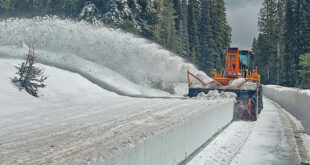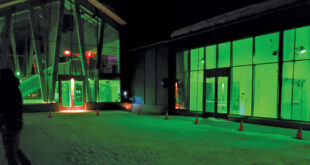Be careful of the slippery slope…
As expected, the public was concerned about a proposal to allow “food trucks” to operate on public property late at night in Crested Butte. And as expected, most of the concerns came from Elk Avenue restaurateurs.
The Town Council set an official public hearing on the proposed ordinance for March 19.
The council is reacting to a request by the Mountain Oven Bakery, which bought the old “Roach Coach” and would like to serve hot, organic food between 10 p.m. and 2:30 a.m. near the bars on Elk Avenue.
The staff came to the council with a draft ordinance at the March 5 meeting. The ordinance limits the trucks to the B-1 zone of town and the size of the truck to no larger than eight by 20 feet. Staff suggested charging an application fee of between $350 and $450. The town would issue no more than two permits a year, would limit the signage allowed on the vehicle, and would make the trucks comply with similar regulations currently imposed on food carts.
Shawn Mast told the council he has been working on setting up a food cart under the current town regulations to serve the same late-night purpose.
“My preference is for you not to change the regulations,” Mast said. “I don’t want to overfill the market. I hope to be up and running this spring. Kochevar’s is already providing late-night food from a window and I hope to do it from a cart. I’ve been working on doing this under the current ordinance. That’s my American dream. I had planned to buy the Roach Coach but followed the town regulations instead.”
Paradise Café owner Lee Dickelman said he wanted to make sure a food truck was subject to the same inspections and permits as any restaurant. Town Clerk Eileen Hughes assured him that the state health inspector would inspect the truck.
Forest Queen and Old Croatian manager Dutch Spahn runs the late-night food window from Kochevar’s/Karolina’s. “There isn’t much late business out there to accommodate more than one outlet,” he told the council. “There’s not been a lot of business for restaurants in general this winter. It doesn’t seem fair that someone could pull up in front of our business and start selling food.”
Brick Oven co-owner Dan Loftus had similar concerns. “To think a truck could pull up and start selling food in front of our business is offensive. We’ve worked and paid taxes and paid fees and employ a lot of people,” he said. “Every dollar spent toward carts, trucks, flea markets, farmers markets, etc., leads to a bigger risk of vacancy on Elk Avenue. The council has always talked about revitalizing Elk. I don’t think this is the answer. If you allow people to operate business on public land, you have to know eventually someone will try to take advantage of it.”
“My concern is for the brick-and-mortar businesses,” said Councilperson Jim Schmidt. “That concern rubs against free enterprise. It’s tough sometimes.”
“If you allow this, I would suggest it be allowed anywhere but in the B-1 zone,” added Loftus. “That’s the most crowded stretch of town. It is the core of the historic district. What’s historical about an idling truck? We have run some late nights with the kitchen open late. It’s something we would consider in the future. We have outdoor seating in the summer. This doesn’t make sense.”
“I don’t have an issue with the cart concept,” said Spahn. “And the truck is already allowed to park and sell food by the Four-Way. A food truck in the middle of town just doesn’t seem like the right concept.”
Mountain Oven co-owner Chris Sullivan addressed some of the criticism and concern. “We know where the people are late at night and it’s not at the Four-Way,” he said. “The truck won’t be idling and we’re not trying to sneak in and get out of paying fees tied to a business in Crested Butte. We’re trying to provide a diversity of business in Crested Butte. I think a food truck culture could help revitalize Elk Avenue at night. There is already some late-night food available and this could complement that.”
Sullivan said because Mountain Oven pays rent to an Elk Avenue business, the business is already contributing to the fees and taxes imposed by the town. “Like a lot of functioning businesses on Elk Avenue, we don’t own a property on Elk. We pay rent and the landlord pays the fees. Perhaps tying the truck permit to an existing brick-and-mortar business is a good idea.”
Brick Oven co-owner Brian Schneider said he didn’t think this group would bend the rules but by changing the outdoor vending regulations, the town could be opening a new can of worms. “It can turn into a slippery slope,” he said. “There was a lot of discussion and thought during the cart discussion. It needs to be scrutinized closely. And businesses should pay to profit. We had to do that. What is a real reasonable fee for a permit in the B-1 zone?”
Councilperson Glenn Michel said he had some concerns with the idea but was leaning toward supporting the changes because of the limited time frame. “Making sure it doesn’t start until 10 o’clock when there is limited food available is a plus from my perspective. I think it could draw some people who don’t want to drink alcohol to Elk Avenue late at night. I wouldn’t want it to compete with existing restaurants. I think it will be tough sledding, but it is your business plan.”
Schmidt said he was having a tough time with the issue and wasn’t sure he could support the changes.
Councilperson David Owen disagreed. “The talk of competing with existing businesses is interesting. Competition is a good thing. I appreciate the brick-and-mortar businesses on Elk Avenue but you have your competitive advantages because of that. I don’t see this as a terrible thing, even with longer operating hours.
“It is creating more layers of opportunity for people in town to make a living here,” Owen continued. “A food truck fits into a specialized niche. A restaurant is an entirely different business model.”
“But they are asking to use the people’s land as opposed to private land and that is a big difference,” noted Michel.
Owen said another difference is that while a truck depreciates in value, a brick-and-mortar building appreciates in value.
“That’s not always true,” responded Loftus. “A lot of buildings are selling for a lot less now than what people paid for them. That point isn’t valid.”
“I just think the more variety the better,” said Owen. “The more competition, the better.”
Councilperson Roland Mason recalled a “more rowdy time in Crested Butte” when there was a late-night line of people buying food. “I think it is a good amenity but I’d be in favor of making the time frame start even later, say 10:30 or 11. Most restaurant kitchens around here are closing up by nine or so. I think this fills a niche, especially in summer and I think it could bring more people downtown.”
Mayor Aaron Huckstep said he’d like to see the staff come up with solid rational nexus for the fee being charged. “And I like the idea of allowing it to start at 11 o’clock,” he said. “But we have heard the fee argument before from businesses. We are asked to be consistent with the fees the brick-and-mortars had to pay. Asking us to be consistent is a good thing.”
“At some point it is a gut check,” responded town Building Director Bob Gillie. “What is a fair fee for people to use public property?”
The council agreed to consider the ordinance at the next meeting. An official public hearing on the matter will be held at that time.
 The Crested Butte News Serving the Gunnison Valley since 1999
The Crested Butte News Serving the Gunnison Valley since 1999



